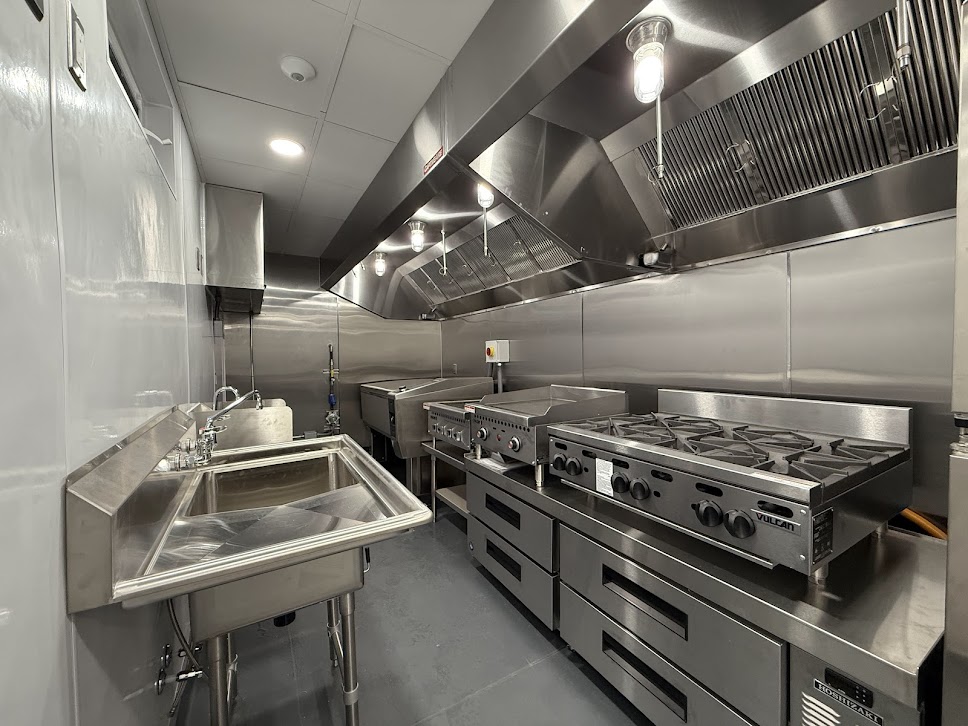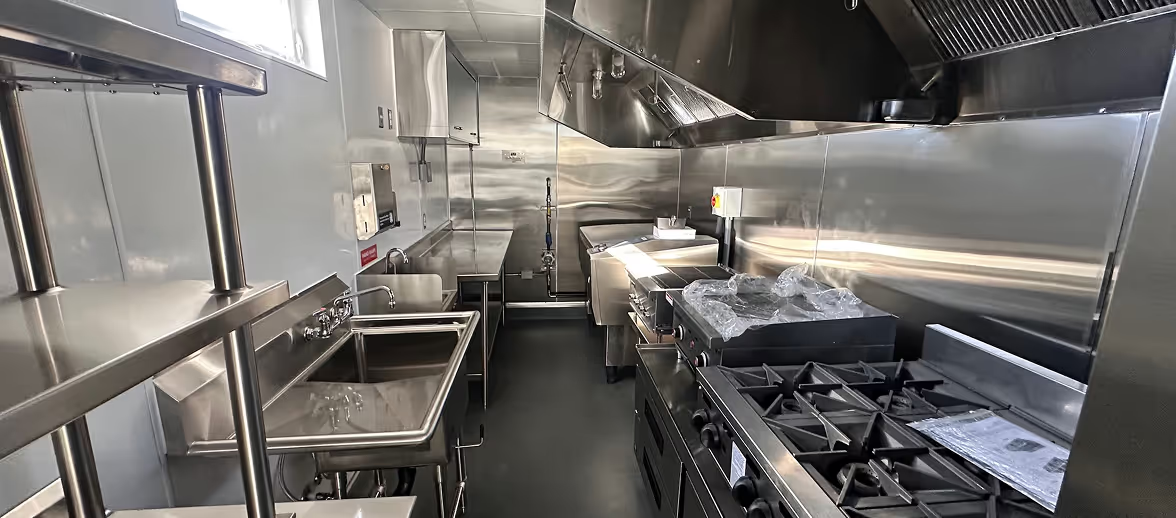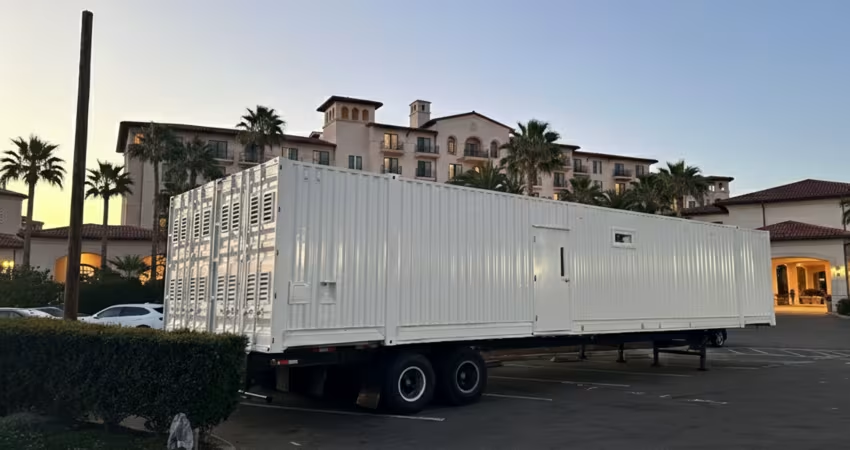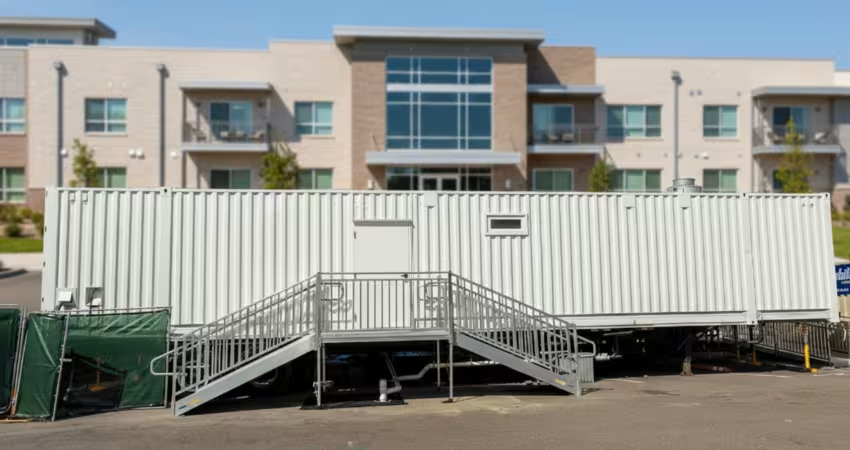%2520(1).jpeg)
Introduction
Commercial kitchens are the beating heart of any foodservice operation. But what happens when your permanent kitchen is under renovation, your business expands to a new location, or you need to serve hundreds of guests at an outdoor event or even in a disaster zone?
In 2024, the mobile kitchen industry surged to a remarkable $1.8 billion valuation, reflecting the escalating demand for on-the-go culinary solutions. From high-end hotels and resorts to catering companies, schools, and emergency response agencies, operators across the country rely on mobile kitchens to maintain uninterrupted, high-quality foodservice operations.
In this comprehensive guide, you'll explore everything you need to know about mobile kitchen rentals, including the different types of units, their benefits, regulatory considerations, cost factors, and how to select the ideal setup for your specific needs. Whether you're managing a hospitality brand or overseeing critical infrastructure, this resource is designed to help you make informed, confident decisions.

Introduction to Mobile Kitchen Trailers
Mobile kitchen trailers are essentially fully-equipped, portable commercial kitchens designed to meet diverse culinary needs, ranging from event catering and disaster relief to temporary food service during renovations. Each trailer typically includes professional-grade kitchen appliances, plumbing, advanced HVAC systems compliant with OSHA ventilation standards, and essential add-ons like grease traps and wastewater tanks.
Key Benefits of Mobile Kitchen Trailers:
- Flexibility & Mobility: Deployable almost anywhere, from busy festivals to remote emergency sites, enabling operations to remain agile and responsive.
- Cost Efficiency: Significantly cheaper than constructing traditional kitchens, making them ideal for temporary needs or seasonal operations.
- Rapid Deployment: Unlike brick-and-mortar facilities that take months to build, mobile kitchens can be operational within days or weeks.
- Reduced Business Risk: Allows hospitality businesses to test new culinary concepts and locations without heavy capital investment.
- Eco-Friendly: Generate significantly less waste compared to permanent kitchen constructions and can incorporate energy-efficient and sustainable materials.
Tip: Consider your anticipated usage duration when deciding between renting or purchasing. Rentals are ideal for short-term needs (3–24 months), while purchasing suits long-term operational strategies.
Common Use Cases Include:
- Event catering for weddings, concerts, and sports events.
- Emergency relief operations by organizations like FEMA.
- Foodservice solutions for film production sets.
- Support during kitchen renovations or construction projects.
- Seasonal operations like pop-up restaurants.
- Hospitality support for resorts and hotels during high-traffic periods.
Note: According to the CDC, ensuring food safety during temporary kitchen operations is crucial, emphasizing the importance of selecting compliant mobile kitchen providers.
Get a more complete introduction to mobile kitchens here!
How Mobile Kitchens Are Designed and Built for Rental Use
Every day of downtime can cost a commercial kitchen around $1,900, according to the National Restaurant Association. In high-end hospitality, downtime can severely impact guest satisfaction, operational efficiency, and brand reputation. That's why the meticulous design and construction of mobile kitchens are crucial for ensuring business continuity.
Strategic Design Features:
- Modular Layouts: Versatile interiors allow for quick adaptation to various culinary operations without structural modifications.
- Smart Utility Integration: Propane, water, and electrical systems designed for seamless operation both on-grid and off-grid.
- Ergonomic and Safe Layouts: Non-slip flooring, ADA compliance, and strategic equipment placement reduce worker fatigue and enhance safety.
- Compliance-Ready: Built to exceed local health codes, NSF certifications, and ADA standards to prevent costly delays or modifications.
Note: Modular designs can reduce setup times by 50%, significantly boosting operational efficiency.
Fabrication for Durability:
- High-Quality Materials: Constructed with stainless steel for longevity, easy maintenance, and superior sanitation.
- Standardization: Uniform designs simplify training, maintenance, and repairs, enhancing service continuity.
- Rigorous Testing: Comprehensive checks of plumbing, gas, electrical systems, and fire suppression to ensure reliability from day one.
Delivery & Installation:
- Rapid Setup: DOT-compliant units with quick-connect utilities can be operational within hours of delivery.
- Site Adaptability: Engineered to function seamlessly across diverse environments, including challenging terrains and remote locations.
- Comprehensive Documentation: User manuals and guided walkthroughs ensure smooth transitions and confident operation.
Operational Excellence & Support:
- Quick Turnover: Efficient cleaning and standardized layouts reduce downtime between rentals by up to 40%.
- User-Friendly Design: Clearly labeled systems and intuitive layouts support ease of operation for varied staffing scenarios.
- Proactive Maintenance: Easily accessible components and real-time monitoring systems ensure optimal performance and minimal downtime.
Understand how mobile kitchen rentals are designed and built here!
%2520(1).jpeg)
Mobile Kitchen: How to Choose the Perfect Unit to Rent
Selecting the right mobile kitchen is crucial, especially when unexpected downtime occurs during peak seasons. Whether due to planned renovations or unforeseen emergencies, the right mobile kitchen ensures your operations continue smoothly.
Factors to Consider When Choosing Your Mobile Kitchen:
- Purpose & Timeline: Define your operational needs clearly, considering your menu, service volume, and rental duration.
- Space & Layout Needs: Assess staff numbers, functional area requirements, and available physical space.
- Equipment & Storage: Choose essential cooking and storage equipment based on your menu and storage needs.
- Utility & Infrastructure: Confirm your unit’s power, water, gas, and waste management capabilities align with your site's available utilities.
- Site Logistics: Ensure ease of site access for delivery, setup, removal, and compliance with local permitting requirements.
- Code Compliance: Confirm the kitchen meets health, fire safety, and ADA accessibility codes to avoid compliance-related delays.
- Budget Planning: Account for total costs including rental fees, delivery, utility connections, and insurance.
Tip: Always verify insurance coverage and consider potential hidden costs like setup and permitting fees.
Learn how to choose the perfect mobile kitchen to rent here!
Mobile Kitchens: Buying vs Renting vs Leasing
Choosing between buying, renting, or leasing a mobile kitchen significantly affects your operational strategy and budget.
Buying:
- Pros: Long-term ownership, full customization, and unrestricted usage.
- Cons: High upfront investment ($150,000-$500,000), ongoing maintenance responsibilities.
Renting:
- Pros: Lower initial costs, flexibility, rapid deployment, and minimal maintenance.
- Cons: Higher long-term expense for extended use, limited customization, potential availability risks.
Leasing:
- Pros: Manageable monthly payments, newer equipment, option to buy.
- Cons: Contractual commitment, potentially higher long-term costs.
Decision Factors:
- Duration of Use: Short-term favors renting, mid-term leasing, long-term buying.
- Budget & Financing: Renting/leasing spreads out costs, buying builds equity.
- Customization: Buying offers maximum customization, renting minimal.
- Compliance: Choose providers who ensure compliance and support permitting.
Read more about the comparisons between buying, renting and leasing mobile kitchens here!
%2520(1).jpeg)
How Much Does It Cost to Rent a Mobile Kitchen?
Understanding the true cost of renting a mobile kitchen is essential for accurate budgeting and smooth operations. Rental prices typically range widely depending on several factors, including kitchen size, rental duration, equipment needs, and deployment location.
Typical Cost Ranges:
- Daily Rentals: $250 – $2,000+
- Weekly Rentals: $1,500 – $8,000
- Monthly Rentals: $5,000 – $50,000+
Factors Influencing Rental Costs:
- Size and Layout: Larger kitchens with multiple operational zones typically command higher rental rates due to greater capacity and versatility.
- Specialized Equipment: Specialized cooking appliances like combi ovens or tilt skillets may increase rental costs due to higher installation complexity.
- Rental Duration: Longer-term rentals often benefit from discounted rates, while shorter, emergency, or flexible agreements might incur premiums.
- Deployment Location: Remote or challenging locations increase transport and setup expenses.
- Permitting and Compliance: Fees for municipal permits, inspections, and necessary code upgrades can significantly influence overall costs.
- Maintenance and Service Support: Extended or intensive usage may require additional maintenance services, potentially increasing total expenses.
- Optional Add-ons: Additional equipment like generators, ADA ramps, or grease traps usually incur extra fees.
Budgeting Tips:
- Hidden Fees: Account for potential hidden expenses such as utility hookups, cleaning fees, insurance, and deposits.
- Contract Clarity: Clearly understand terms for early termination, extensions, or damage liability.
- Provider Support: Engage providers offering comprehensive permitting assistance, maintenance, and transparent pricing structures.
Read more about how much it costs to rent a mobile kitchen here!
What Regulations Apply to Mobile Kitchen Rentals?
Operating a mobile kitchen involves compliance with comprehensive regulations at local, state, and federal levels. Proper adherence to these regulations is essential to avoid fines, shutdowns, and protect public health.
Key Regulatory Areas:
- Food Safety Standards: Adherence to FDA Food Code, including temperature control (cold holding at ≤41°F, hot holding ≥135°F), cooking temperatures, cross-contamination prevention, and strict employee hygiene.
- Fire Suppression and Ventilation: Compliance with NFPA 96 standards, including commercial ventilation hoods, automatic fire suppression systems, and class K extinguishers.
- Sanitation and NSF Certification: Requirement for NSF-certified equipment, three-compartment sinks, handwashing stations, proper food storage, and robust pest control measures.
- Utility Compliance: Ensuring potable water supply, wastewater containment, NEC-compliant electrical systems, adequate lighting, and continuous hot water supply.
- Zoning and Location Regulations: Compliance with local zoning laws covering distance restrictions, temporary use permits, public right-of-way rules, and operating hours.
- Accessibility and ADA Compliance: Mandatory ADA-compliant entrances, service counters, restrooms, signage, and clear floor space.
- Licensing and Permitting: Acquiring necessary permits including business licenses, food establishment permits, fire department approvals, commissary agreements, and temporary permits for events.
Common Pitfalls and How to Avoid Them:
- Automatic Compliance Assumption: Always verify local standards independently despite the kitchen’s equipment certifications.
- Commissary Oversight: Arrange commissary agreements and waste disposal plans early.
- Documentation Needs: Maintain an organized compliance binder with permits, certifications, and logs.
- Licensing Errors: Secure location-specific licenses and confirm validity before operation.
- Approval Timelines: Allow 4–8 weeks for regulatory reviews and build contingency into your timelines.
Learn what regulations apply to mobile kitchen rentals here!
%2520(1).jpeg)
Why Hotels and Resorts Turn to Mobile Kitchens for Temporary Foodservice Solutions
When hotels and resorts face kitchen renovations, equipment failures, or emergencies, mobile kitchens become essential to maintaining guest satisfaction and revenue. These fully equipped, commercial-grade units enable properties to deliver uninterrupted foodservice on-site. Benefits include rapid deployment (often operational in 24–72 hours), compliance with NSF, NFPA, and ADA standards, and flexibility to support banquets, room service, or outdoor events.
Advantages:
- Rapid Deployment: Avoid costly downtime and lost revenue.
- Operational Continuity: Maintain guest experience without disruption.
- Flexible Configurations: Scale up or adapt layouts for seasonal demand.
- Compliance: Meet all food safety, fire, and accessibility regulations.
Use Cases:
- Renovations: Mobile kitchens prevent revenue loss during long-term upgrades.
- Emergency Response: Quick deployment after disasters keeps service operational.
- Seasonal Demand: Extra capacity for holidays or large events.
- Remote Locations: Enable premium service without permanent infrastructure.
Understand why hotels and resorts turn to mobile kitchens here!
%2520(1).jpeg)
When and Why Mobile Kitchens Are Rented for Events and Festivals
Events and festivals often require foodservice infrastructure that can handle high volumes without sacrificing quality. Mobile kitchens are fully equipped, professional-grade units that allow caterers, hotels, and event organizers to deliver exceptional meals anywhere. From music festivals and corporate launches to weddings and culinary showcases, mobile kitchens provide unmatched flexibility and compliance.
Benefits:
- Rapid Setup: Be operational in as little as 24–72 hours.
- High Capacity: Serve hundreds or thousands of meals per day.
- Adaptability: Scale configurations to suit any event type.
- Code Compliance: Meet NSF, NFPA, and ADA standards.
Use Cases:
- Large music and arts festivals needing high-output kitchens.
- Corporate brand activations requiring custom layouts.
- Weddings or pop-ups at scenic, infrastructure-limited venues.
- Culinary competitions and food expos.
Read more about when and why mobile kitchens are rented for events & festivals here!
When and Why Mobile Kitchens Are Rented for Emergency Response and Disaster Relief
When disasters strike, be it hurricanes, wildfires, floods, or public health emergencies, mobile kitchens become essential tools for feeding affected communities and emergency responders. These fully equipped, commercial-grade units can be deployed rapidly, providing safe, sanitary, and high-volume meal service when infrastructure fails.
Benefits:
- Rapid Deployment: Operational in 24–72 hours.
- High-Capacity Production: Serve hundreds to thousands of meals daily.
- Code Compliance: NSF, NFPA, and ADA standards.
- Scalability: Combine units to expand meal output.
- Reliability: Engineered for continuous use in challenging conditions.
Use Cases:
- Natural disaster relief for displaced residents.
- Emergency shelters needing kitchen facilities.
- Military or FEMA operations in remote areas.
- Urban shelters during public health emergencies.
Read more about when and why mobile kitchens are rented for disaster relief here!
.jpeg)
Conclusion and Next Steps
Mobile kitchen rentals have evolved from temporary stopgaps into essential tools for modern foodservice, combining professional-grade capabilities with unmatched flexibility and speed. Whether you’re planning a large event, managing a renovation, or preparing for emergencies, the right mobile kitchen can protect revenue, maintain compliance, and ensure uninterrupted service.
Mobile Culinaire is the trusted partner for premium mobile kitchen rentals. With decades of experience and over 400 units deployed nationwide, we deliver proven performance, compliance, and flexibility. Every trailer is built in Oregon for unmatched quality and durability. Our team specializes in rapid deployment, compliance support, and seamless project management.
Available Models and Capacities:
- 32′ Trailer: 150–200 meals
- 40′ Trailer: 200–250 meals
- 53′ Trailer: 300–450 meals
- 2×53′ Complex: 500–650 meals
If you’re ready to explore solutions that fit your operation, you can view our mobile kitchen rentals, explore our project portfolio, or contact our specialists to start planning your setup today.
People Also Ask (FAQ)
What is a mobile kitchen used for?
A mobile kitchen is a fully equipped, transportable kitchen trailer used to prepare and serve food when permanent facilities are unavailable. It’s commonly used for renovations, large events, emergency response, and pop-up operations.
How much does it cost to rent a mobile kitchen?
Rental prices range from about $3,000 to over $50,000 per month, depending on the kitchen’s size, equipment, duration, and location. Additional costs can include delivery, permits, and utilities.
Are mobile kitchens compliant with health and safety codes?
Yes. Professional mobile kitchens are built to meet strict NSF, NFPA, and local health department standards. Operators are still responsible for securing permits and passing inspections before operation.
Is it better to rent, lease, or buy a mobile kitchen?
It depends on your timeline and budget. Renting is ideal for short-term needs like renovations or events. Leasing suits 1–3 year projects. Buying is best for permanent operations or repeated long-term use.
How quickly can a mobile kitchen be deployed?
Mobile kitchens can typically be delivered and operational within 24–72 hours, depending on site readiness, permitting, and utility hookups.
Testimonial

"What is standing out when you look at the mobile kitchen operation is the efficiency that we can really achieve because it's built for that."
Tell us about your kitchen needs and request a quote.
.png)
Turnkey mobile kitchen
.png)
Proudly made in-house in the USA
.png)
Commercial grade kitchen equipment
.png)
Code-compliant
Trusted by Industry Leaders




.gif)



%20(1)%20(1).avif)